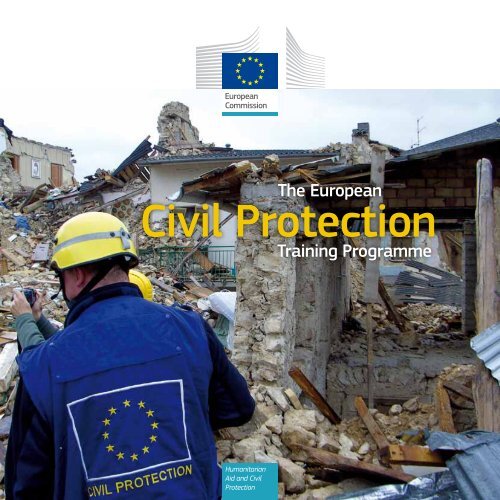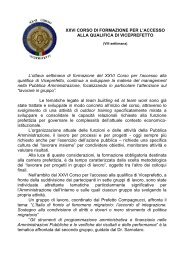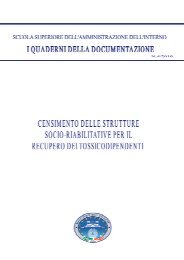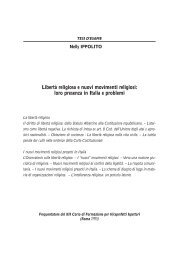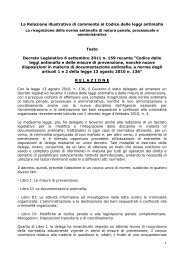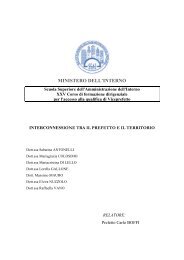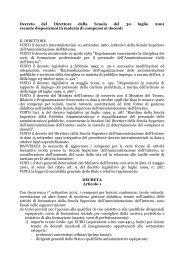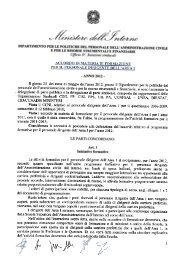The European Civil Protection Training Programme
The European Civil Protection Training Programme
The European Civil Protection Training Programme
- No tags were found...
Create successful ePaper yourself
Turn your PDF publications into a flip-book with our unique Google optimized e-Paper software.
<strong>The</strong> <strong>European</strong><strong>Civil</strong> <strong>Protection</strong><strong>Training</strong> <strong>Programme</strong>HumanitarianAid and <strong>Civil</strong><strong>Protection</strong>
Europe Direct is a service to help you find answersto your questions about the <strong>European</strong> Union.Freephone number (*):00 800 6 7 8 9 10 11(*) Certain mobile telephone operators do not allow access to 00 800 numbers or these calls may be billed.Cover: © Antonin Petr.More information on the <strong>European</strong> Union is available on the Internet (http://europa.eu).Cataloguing data can be found at the end of this publication.Luxembourg: Publications Office of the <strong>European</strong> Union, 2012ISBN 978-92-79-23191-9doi:10.2795/15701© <strong>European</strong> Union, 2012Reproduction is authorised provided the source is acknowledged.Printed in Belgium
2Introduction<strong>The</strong> EU <strong>Civil</strong> <strong>Protection</strong> Mechanism<strong>The</strong> <strong>European</strong> <strong>Civil</strong> <strong>Protection</strong> Mechanism (hereafter the Mechanism) was established in 2001 to support the mobilisation of emergencyassistance from Participating States in the event of major emergencies.EU and countries worldwide are more and more affected by natural and manmade disasters, such as earthquakes, floods, forest fires andterrorist attacks. <strong>The</strong> primary responsibility for dealing with the immediate effects of a disaster lies with the country where it has occurred.Nevertheless, when the scale of the emergency overwhelms national response capacities, a disaster-stricken country can benefit from civilprotection assets or teams available in <strong>European</strong> countries.<strong>The</strong> 32 Participating States of the Community Mechanism are all EU Member States, the <strong>European</strong> Economic Area countries(Liechtenstein, Norway and Iceland), Croatia and the former Yugoslav Republic of Macedonia in their capacity as a candidate country.By pooling the civil protection capabilities of the participating states, the Mechanism can ensure even greater protection of people, propertyand the environment.To ensure an efficient, rapid and flexible response, an extensive training programme is available for national technical and assessment expertsas well as for personnel involved in the civil protection modules and for coordination experts on strategic, tactical and operational level.
<strong>The</strong> <strong>Training</strong> <strong>Programme</strong>3<strong>The</strong> training programme is an essential part of the Mechanism. It is crucial in preparing experts for internationalcivil protection assistance interventions inside as well as outside Europe. It also provides an excellent platform forexperience-sharing and networking between national experts from participating countries. <strong>The</strong> programme involvestraining courses, joint simulation exercises and an exchange programme, where experts can learn first-hand aboutsimilar responsibilities under different national systems.<strong>Training</strong> coursesSince it was launched in 2004, the training programme has developed and now includes 12 courses.<strong>The</strong> target group is wide, which opens the training programme to many different categories of experts. <strong>The</strong>secan range from assessment and coordination experts to specialists within a certain field of work, such asmarine pollution experts, environmental experts (landslides waste management, dam stability etc), experts ingeo-hazards or logistics in emergency operations, and medical staff.All courses combine theory and field experience, as well as international guidelines and standard operatingprocedures. <strong>The</strong>y all contain practical exercises (field and table-top) based on different emergency scenarioswhere participants get the opportunity to practise their skills in a realistic setting.In order to benefit most, candidates are encouraged to follow courses according to a basic order.All courses from the 10th cycle onward (mid 2012) will conclude with a final test in order to review the progressof the participants during the course.A certificate is handed out at the end of each course providing the participant has attended the entire course.From the 11th cycle onward (mid 2013), candidates make use of a distance preparation tool. Candidatesconclude their preparation with a certification test to gain admission to the course. This certification does notapply to CMI, TEC, MBC, OPMR, HLCR and HOT.
4<strong>Training</strong> Courses Overviewand Basic Order10th-13th cycles (2012-2016)INTRODUCTIONCommunity MechanismIntroduction Course4 daysTechnical ExpertsCourse6 daysDistance PreparationCertificate requiredbeforeadmission to courseDistance PreparationTool availableOperational ManagementRefresher Course2 daysconference/workshopsOperational ManagementCourse8 daysModules BasicCourse6 daysInformation ManagementCourse44 daysAssessment MissionCourse6 daysOPERATIONALSecurity Course4 daysInternational CoordinationCourse44 daysHigh Level CoordinationCourse4,5 daysHigh Level CoordinationRefresher Course2 daysconference/workshopsHead of Team Course4,5 daysMANAGEMENTSpecific course orderdetermined byEUCPT-function
Community MechanismIntroduction Course (CMI)5Introduction<strong>The</strong> Community Mechanism Introduction Course (CMI) is a four-day introductory course and the main entry point to all courses offered withinthe training programme (TEC and MBC excluded, as they serve a different purpose). <strong>The</strong> course provides generic information about the EU<strong>Civil</strong> <strong>Protection</strong> Mechanism and actors in an international emergency environment inside and outside Europe. It is mainly aimed at all stafffrom civil protection and other organisations that could serve as the core for the Host Nation Support in case their country might have torequest and receive international assistance. <strong>The</strong> course is not specifically focussed on deployment in international civil protection assistanceinterventions, although it is the basic knowledge course for those who aim at being deployed, in the end.<strong>The</strong> overall objective of the CMI is to introduce participants to the EU <strong>Civil</strong> <strong>Protection</strong> Mechanism and provide them with the basicknowledge and skills to prepare themselves for actions in the field of Host Nation Support as well as provide them with the first informationon international civil protection missions, both within and outside the Mechanism’s geographical area.Brief course descriptionParticular focus is put on the scope, mandate, components and functions of the Mechanism but the course alsocovers a wide variety of other areas to familiarise participants with the international emergency environmentand commonly applied working procedures.<strong>The</strong> course looks at the different civil protection systems within the geographical area covered by the Mechanism andelaborates on Host Nation Support. How to prepare leading national structures for receiving international assistanceand how to support them when assisting are reviewedRelated to the international emergency environment outside Europe, focus lies on international partners andactors <strong>European</strong> teams are likely to encounter. Topics covered include operational structures outside theEU, cultural awareness, Humanitarian Aid and the humanitarian principles and how to organise work in anemergency situation.This is an intensive course, based on a combination of theory, group work and discussion which requires a highdegree of active participation. <strong>The</strong>refore advance preparation is absolutely necessary. Candidates are providedwith pre-reading material.
6Operational ManagementCourse (OPM)Introduction<strong>The</strong> Operational Management Course (OPM) is the first specifically aimed at future deployments inside and outside Europe. It can be regardedas the corner stone of the training programme to follow and as such it provides all the basics that make it possible for graduates to functionas a full member in an On-site Operational Coordination Centre (OSOCC – outside Europe) or coordination setting (inside Europe).It is the second course in the training programme and is open to those who are in possession of the certificate of the CommunityMechanism Introduction Course (CMI) and achieved the Distance Preparation Certificate for the OPM.<strong>The</strong> eight-day course targets national experts and <strong>European</strong> Commission representatives who aim to be potential team members or liaisonofficers of a <strong>European</strong> <strong>Civil</strong> <strong>Protection</strong> team sent by the <strong>European</strong> Commission. <strong>The</strong> set-up of the course mirrors actual mission situationsto a large extent, including a long field exercise.Brief course descriptionTeams of experts are often deployed to emergencies outside the EU and the course focuses on these disastersituations. As inside Europe deployments also have their specifics, attention for this subject is on the agenda as well.<strong>The</strong> main tasks of an EUCP team consist of facilitating the coordination in the field, assessing needs of the affectedcountry and providing expertise, based on the request of the affected country, whether it be inside or outsideEurope. <strong>The</strong> focus of this course is on coordination and course topics include internationally agreed guidelines andprocedures, planning, information management and how key partners work on an operational level, as well asethics, code of conduct and basics on Safety and Security.<strong>The</strong> core objective of the course is not only to improve the individual capabilities of experts and teams, but alsoto enhance their ability to function within a wider framework of international partners.<strong>Training</strong> is carried out within the context of emergency situation scenarios, enabling participants to practice theabove described topics in a realistic setting.
SecurityCourse (SEC)7Introduction<strong>The</strong> four day Security Course (SEC) is one of the specialised courses and is open to those who are in possession of the certificates of theCommunity Mechanism Introduction Course (CMI) and the Operational Management Course (OPM) and achieved the Distance PreparationCertificate for the SEC.As graduates from OPM in principle can be regarded as deployable in specific cases, the SEC should be followed soon after the OPM.Brief course descriptionTeam security is increasingly an essential element of field work duringa civil protection assistance intervention. Interventions often encompassthe element of providing security advice and services to team membersand partners, within the framework of the security regulations that apply.<strong>The</strong> core objective of the Security Course is to enhance participants’understanding, knowledge and skills in terms of security managementat operational and strategic levels so they can act as security advisorswithin the team as well as provide them with the knowledge and skills toact appropriately according to the safety regulations.<strong>The</strong> course is composed of theory and group work sessions, whereparticipants learn about different aspects of security management(international security systems, security assessments, security planningand training). <strong>The</strong> course also includes a field exercise providing participantswith an opportunity to put this into practice in an emergency setting.
8Information ManagementCourse (IMC)Introduction<strong>The</strong> ability to provide accurate information in a timely and effective manner manner to the appropriate stakeholders is of utmost importanceduring disaster response interventions. It can even be described as the most important critical success factor.As the process of information management is seen as key for functioning successfully in operational coordination, the four day InformationManagement Course focuses solely on this topic.<strong>The</strong> IMC is open to those who are in possession of the certificates of the Community Mechanism Introduction Course (CMI) and theOperational Management Course (OPM) and achieved the Distance Preparation Certificate for the IMC.Preferably the IMC should be followed directly after the SEC.Brief course description<strong>The</strong> overarching aim of the IMC is to facilitate assessment, coordinationand decision-making during expert interventions through strengthenedinformation management processes. Specifically, the course objectivesare to improve the participants’ understanding of how sound informationmanagement practices can facilitate the mission, increase and broadentheir understanding and ability to apply standard information tools usedin emergencies and identify best practices and share experiences interms of information management.<strong>The</strong> course is formed around the information management cycle and iscomposed of theory, group work sessions and practical exercises basedon realistic disaster scenarios.
International CoordinationCourse (ICC)9Introduction<strong>The</strong> four day International Coordination Course (ICC) is one of the specialised courses of the training programme and is open to those who arein possession of the certificates of the Community Mechanism Introduction Course (CMI) and the Operational Management Course (OPM) andachieved the Distance Preparation Certificate for the ICC.However, according to the basic order of courses, having graduated from the Security Course (SEC or MSC as equivalent) and the InformationManagement Course (IMC) before the ICC is preferred.Brief course descriptionEven though all courses in the training programme contain elementsof international coordination mechanisms and procedures, the growingcomplexity of disaster response requires experts to have in-depthknowledge of these mechanisms and procedures. This is particularlynecessary in large-scale emergencies where many organisations, alsofrom the <strong>European</strong> institutions, as well as military components areinvolved or in situations with additional challenges, such as a difficultpolitical environment.<strong>The</strong> overall objective of the course is to increase participants’ knowledgeof, and ability to work with or under the overall coordination of otherinternational response systems like the United Nations. Internationalcoordination mechanisms, civil military coordination and the approach ofother organisations in the field of disaster management are covered bythe course, which is composed of theory, case study-based group worksessions and practical exercises.
10Assessment MissionCourse (AMC)Introduction<strong>The</strong> Assessment Mission Course (AMC) is a six day specialised course for national experts and managers in the field of emergencymanagement, <strong>European</strong> Commission officials and experts from partner organisations likely to be involved in international civil protectioninterventions where assessment activities are to be expected.<strong>The</strong> AMC is open to those who are in possession of the certificates of the Community Mechanism Introduction Course (CMI) and theOperational Management Course (OPM) and achieved the Distance Preparation Certificate for the AMC.Having followed the other courses according to the basic order of courses is preferred (SEC – or MSC as equivalent –, IMC and ICC).Brief course descriptionWhile on mission, experts are engaged by the <strong>European</strong> Commission tocarry out their tasks by assisting local authorities in close cooperationwith the UN and other international organisations on site.<strong>The</strong> experts attending the Assessment Mission Course will be trainedto carry out assessment in a wide array of needs (humanitarian andcivil protection), related to the specific mandate of an EU <strong>Civil</strong> <strong>Protection</strong>team. <strong>The</strong> set-up of the course mirrors actual mission situations toa large extent.<strong>The</strong> core objective of the course is not only to improve the individualcapabilities of experts and teams, but also to enhance their ability tofunction within a wider international framework. <strong>The</strong> course includessessions on how to prepare and perform a field assessment, negotiationskills and information management. <strong>The</strong> main focus of the course is a longfield exercise, where participants get to test their new skills performingneeds assessments on a wide variety of location settings and meetinglocal officials who are experienced in managing real emergency situations.
High Level CoordinationCourse (HLC)11Introduction<strong>The</strong> High Level Coordination course (HLC) is the third general course in the training programme and is the end-course for all teammembers (if graduated). It aims at experts who could be selected as members of a team that can be deployed by the <strong>European</strong>Commission to facilitate coordination assistance in emergencies. <strong>The</strong> course takes 4½ days.<strong>The</strong> HLC is open to those who are in possession of the certificates of the Community Mechanism Introduction Course (CMI) and theOperational Management Course (OPM) and achieved the Distance Preparation Certificate for the HLC.Having followed the other courses according to the basic order of courses is preferred.In specific cases candidates (like from other organisations or with extensive field-experience) can be admitted directly after permissionof the <strong>European</strong> Commission.If necessary an upgrade-day can be organised for these candidates the day before the actual course starts.Brief course description<strong>The</strong> course focuses on emergencies outside the Mechanism’s geographical area and how to work within a widerinternational framework. <strong>The</strong> course contains strategic and political aspects of international disaster managementand humanitarian assistance, such as mission management, negotiation, international coordination policy, staffmanagement, the legal framework of international disaster management operations and media relations.Group work, based on case studies, is an important part of the course where the participants can discussexperiences, alternatives and best practice for managing the mission itself during complicated situations.<strong>The</strong> course concludes with a two day field exercise where participants can practice the different team rolesin a realistic setting.<strong>The</strong> certificate of the HLC is one of the prerequisites for attending the next course, the Head of Team course (HOT).
12Head of TeamCourse (HOT)IntroductionBeing a Head of Team during civil protection interventions putsa heavy responsibility on the shoulders of the selected person. Thatis why national experts graduated from the High Level Coordinationcourse and selected to potentially become a Head of Team, areoffered an additional training of 4½ days.<strong>The</strong> HOT is open to those who have acquired the certificate for theHigh Level Coordination course and were selected as a candidatefor the Head of Team course.Brief course descriptionDiplomatic behaviour, political dynamics in disaster affected regions,relations with and between <strong>European</strong> institutions, relevant internationalagreements as well as Council and Commission Decisions and their impacton coordination during interventions inside and outside the <strong>European</strong>Union, the ability to interact effectively with the media in stressfulsituations as well as internal team management and -psychology andleadership are addressed in the course. <strong>The</strong>se are subjects that demandthe full commitment of the participants and extensive preparation.
Technical ExpertsCourse (TEC)13IntroductionExperience from previous civil protection assistance interventions, as well as training assessment and coordination experts, have shownthat there is a need to train technical specialists for expert interventions. <strong>The</strong> Technical Experts Course (TEC) is a six day course designedspecifically for technical experts such as marine pollution and water management experts, environmental experts (landslides, wastemanagement, dam stability etc), geo-hazard or logistics experts, medical staff and infrastructure engineers.Brief course description<strong>The</strong> course combines the most essential topics from the CommunityMechanism Introduction (CMI) and the Operational Management Course(OPM) to give participants a solid base for participating in future civilprotection assistance interventions. <strong>The</strong> main objective is to introducetechnical experts to the Mechanism and the mission cycle of operations.It also aims to increase their knowledge of international responsesystems and coordination mechanisms and their teamwork capability ina multi-cultural and multi-disciplinary team. Experiences from previouscivil protection assistance interventions, particularly those where specialexpertise was required and/or used, will also be discussed.<strong>The</strong> course is composed of theory, group work sessions and a practicalexercise based on disaster scenarios.As the Technical Experts Course aims at preparing technical experts forinternational missions in their field of experience within the frameworkof the Mechanism, graduates are invited to attend other courses in thetraining programme on the same basis as experts who have completedthe Community Mechanism Introduction course (CMI).For technical experts, the certificate of the TEC is one of the prerequisitesfor attending the next course, the Operational Management course (OPM).
14Modules Basic Course(MBC)Introduction<strong>The</strong> six day Modules Basic Course (MBC) is a stand alone course within the training programme. <strong>The</strong> target group is key staff fromparticipating countries that would be deployed with their civil protection module to an emergency within or outside the <strong>European</strong> Union. Keystaff can include team leaders, deputy team leaders, liaison officers or communications officers. It is recommended (but not compulsory)that participants attend the Community Mechanism Introduction (CMI) course before going to the Modules Basic Course (MBC).Brief course description<strong>The</strong> course includes theory, group sessions andcase study work, as well as an exercise. <strong>The</strong> mainpurpose of the course is to increase participants’capability to manage the civil protection modulesin a multi-task and multi-stakeholder operationand to integrate them into existing national andinternational coordination arrangements in adisaster-affected country. <strong>The</strong> course focuses onthe crucial issue of interoperability when teamsare deployed alongside units from other countries.For members of the target group who havenot followed the CMI before, the certificateof the MBC is a prerequisite for attendingthe next course, the Community MechanismIntroduction course (CMI). For those who havealready followed the CMI, the next course isthe Operational Management course (OPM).
Operational Management15Refresher Course (OPM-R)High Level CoordinationRefresher Course (HLC-R)Introduction<strong>The</strong> field of emergency response is a constantly changing environment. No two emergencies are exactly the same. New actors enter thefield or existing ones have their mandate changed. Changing situations, also inside the <strong>European</strong> Commission and the development ofnew techniques and equipment mean that experts need to learn about the latest developments, as well as refresh knowledge gained onearlier courses.<strong>The</strong> OPM-R and HLC-R can be regarded as “consolidation courses”. By following them, candidates show their interest to remain activewithin the Mechanism. As individual candidates know best in which field they need to be updated, these courses are organised in a two dayconference/workshop on different topics.<strong>The</strong> OPM-R is open to those who are in possession of the certificates of the Community Mechanism Introduction Course (CMI) and theOperational Management Course (OPM) and achieved the Distance Preparation Certificate for the OPM-R.<strong>The</strong> HLC-R is open to those who are in possession of the certificates of the Community Mechanism Introduction Course (CMI), the OperationalManagement Course (OPM) and the High Level Coordination course (HLC). In specific cases candidates that graduated from the HLC directly(because of their previous experience) can be admitted after permission of the <strong>European</strong> Commission.Brief course description<strong>The</strong> Operational Management Refresher course makes use of operationallessons learned from recent deployments of expert teams. <strong>The</strong> participantscan meet with experienced trainers on different subjects.<strong>The</strong> High Level Coordination Refresher course focuses more on thestrategic and political dimensions of international disaster managementand humanitarian assistance, in relation with recent emergencies.
16How to participateFor each cycle of training courses, the total number of course places is divided between the Participating States(except for the MBC and HOT) and external organisations. This quota is based on the reported training needsof the country as well as the size of the country. To administrate training-related issues, each ParticipatingState has appointed a national training coordinator who is responsible for identifying and nominating expertsto attend the training courses.It is therefore not possible for individual national experts to sign up for a course directly.A list of national training coordinators can be found on Europa website. Information on the training programmecan also be found on the virtual On-Site Operations Coordination Centre (V-OSOCC), which is a virtual platformdeveloped by the Emergency Response Coordination Centre (ERCC) in the United Nations Office for Coordinationof Humanitarian Affairs (UN OCHA) in Geneva, Switzerland.Contact details:DG for Humanitarian Aid and<strong>Civil</strong> <strong>Protection</strong> (ECHO)Directorate ECHO B -Humanitarian Aid and <strong>Civil</strong><strong>Protection</strong> OperationsUnit ECHO B.1 - EmergencyResponsehttp://ec.europa.eu/echo/index_en.htmecho-CP<strong>Training</strong>@ec.europa.euTo increase collaboration with other international actors and facilitate cooperation in the field, partners such asother <strong>European</strong> Commission services, the United Nations and the Red Cross Red Crescent Movement are invitedto participate in relevant courses.VOSOCC website:http://ocha.unog.ch/virtualosocc/(j3qg5rextnv2v045nexwssej)/VOLogin.aspx
<strong>European</strong> Commission<strong>Civil</strong> <strong>Protection</strong> <strong>Training</strong> <strong>Programme</strong>Luxembourg: Publications Office of the <strong>European</strong> Union2012 — 16 pp. — 21 x 21 cmISBN 978-92-79-23191-9doi:10.2795/15701HOW TO OBTAIN EU PUBLICATIONSFree publications:• via EU Bookshop (http://bookshop.europa.eu);• at the <strong>European</strong> Union’s representations or delegations. You can obtain theircontact details on the Internet (http://ec.europa.eu) or by sending a fax to+352 2929-42758.Priced publications:• via EU Bookshop (http://bookshop.europa.eu).Priced subscriptions (e.g. annual series of the Official Journal of the <strong>European</strong>Union and reports of cases before the Court of Justice of the <strong>European</strong> Union):• via one of the sales agents of the Publications Office of the <strong>European</strong> Union(http:// publications.europa.eu/others/agents/index_en.htm).
KR-30-12-451-EN-C


